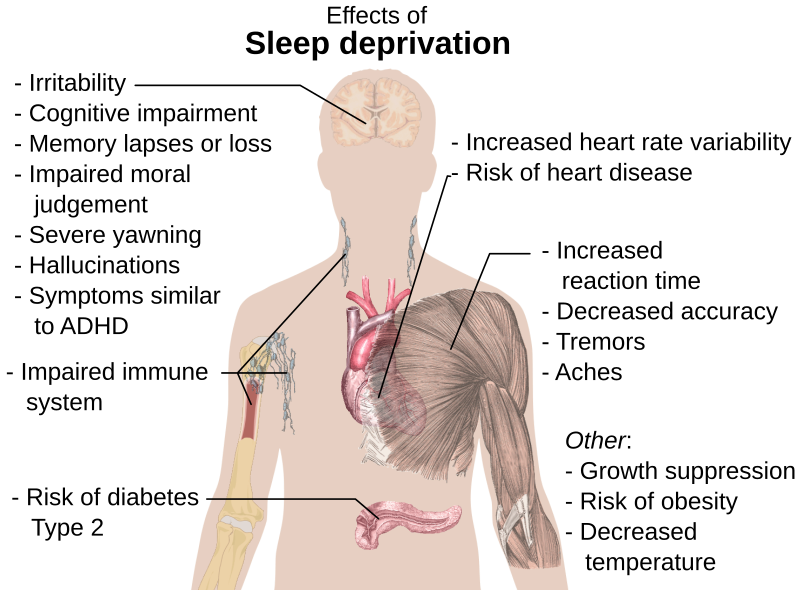Never Believe that a few Caring People can't Change the World. - Margaret Mead
Slumber deprivation is pretty common these days—it's a major attribute of achievement-oriented societies—but why would anyone have a love-detest human relationship with it? Usually, 1 would say,sleep deprivation and all the accompanying symptomsare the definition of a love-hate human relationship, to the core.
Let me tell you something: yous canuse sleep deprivation for your own do good. We'll get into how this works, but first, let'southward discuss the miracle of sleep, sleep impecuniousness and its symptoms, and finally design a "how to" experiment about sleep deprivation(commonly known as self-torture), and ask ourselves, more importantly, why?
Sleep: Functionality
"Sleep is a naturally recurring state characterized by reduced or absent consciousness, […] and inactivity of nearly all voluntary muscles." (Macmillan, 1981). This is a short and articulate explanation:
- sleep is characterized past sleep stages/cycles (v cycles, differing in depth)
- the deeper your sleep, the ameliorate the quality of slumber
- More Sleep ≠ Amend (healthy avg. seven.five-9 hours)
The functions of sleep are very multifaceted and majorly unexplored, only these (validated, and unremarkably accepted) aspects interest us the most correct now. Sleep has a major impact:
- on our memory and the ability to re-organize thoughts, experiences and to learn new things (neuroplasticity)
- on the regulation of necessary hormones and the ability of our body to regenerate physically
What is Sleep Impecuniousness?
Slumber impecuniousness is the lack of sleep: either it was acquired past a very superficial and brusque sleep (over a menses of some days) or by no sleep at all. The functionality and benefits of sleep are limited every bit a result (meet above), and we might face someserious bug, if we stay sleep-deprived for a prolonged catamenia of time.
The furnishings of slumber deprivation are various; some occur instantly afterastute deprivation, other occur only afterchronic deprivation:

(by Mikael Häggström, Wikimedia Eatables, 2009)
After acute deprivation:
- irritability
- cerebral harm
- memory lapses
- restricted judgement
- astringent yawning
- increased center-rate variability, increased reaction time and decreased accurateness
- temporary emotional instability
After chronic deprivation:
The furnishings of chronic deprivation eddy down to the evolution of various diseases, such every bit:
- Diabetes
- eye disease
- growth suppression
- restricted allowed system functionality
- weight gain/loss
- depression
Due to the diversity of acute deficits, sleep impecuniousness has been used as a successful interrogation technique. In fact, the U.Southward. military authorised sleep deprivation as an interrogation method (Go out no Marks: Enhanced Interrogation Techniques and the Risk of Criminality, August 2007).
But hey, why would at that place exist alove-hate human relationship here? What'due south the benefit for the states?!
How To (..and the benefits of sleep deprivation?!)
The effects of sleep impecuniousness on the human trunk were observed and analyzed in the 70s: the methodological monitoring involved claret analysis, just also neuropsychological instruments to capture the brain activity during sleep-impecuniousness and duringrecovery slumber after deprivation.
The results:"There's evidence of antidepressive effect after sleep deprivation."As a thing of fact, subjects experienced a37.two % improvement in their mood!
The background of these results are diverse—the reasons behind the remarkable mood improvement are, among others:
- biochemical investigations proved an increase of dissimilar hormones, including serotonin and noradrenaline, which are also known to partas a happiness hormone (serotonin) and stimulating hormone (noradrenaline)
- improved slumber continuity and depth in the night after sleep deprivation
These mentioned effects take action in depressedbut too non-depressed people,significant that you can stay awake for a night, brainstorm the adjacent day as yous normally do and attempt to keep yourself awake (that's not very easy!) and go to bed quite early → sleep like a baby → wake upwardly the adjacent morning withmore ability and free energy.
By depriving yourself of sleep, yougear up your biological clock to zero— in instance your time management is messed up and running out of fuel, this can very helpful (a love-detest relationship). You can call sleep impecuniousnessslumberhacking: at first we abstain from slumber, and later (during the recovery night) we skid into a very deep country of sleep, which will regenerate us.
Admittedly, sleep deprivation amid healthy people is often met with skepticism, mainly because healthy subjects can regulate their sleep blueprint in other ways (through nutrition, sleep hygiene and slumber rituals). On the other hand, slumber impecuniousness is gratuitous of any serious side furnishings and tin can serve as a quick fix. Here'due south a short how-to:
- Perform your sleep deprivation "experiment" on the weekend (working in a sleep deprived state can be difficult)
- Keep yourself awake during your sleep deprivation night (and the post-obit day) with the aid of tea or java, but please don't overdo information technology
- Go to bed early on your slumber-deprived solar day, and enjoy your deep recovery nighttime (vii.v – 9 hours)
- Wake up powerful and energized, feeling similar a 1000000 dollars
Later your sleep deprivation experiment you should take care of a well-balanced diet and skillful sleeping habits—practise not regress to old, negative tendencies. Slumber impecuniousness for a night can be applied hands, is highly effective and free of serious side furnishings. Accept you already tried it? Share your experience with us!
Featured photo credit: Lux Graves via unsplash.com
Source: https://www.lifehack.org/articles/lifestyle/never-believe-that-few-caring-people-cant-change-the-world-margaret-mead.html
0 Response to "Never Believe that a few Caring People can't Change the World. - Margaret Mead"
Post a Comment